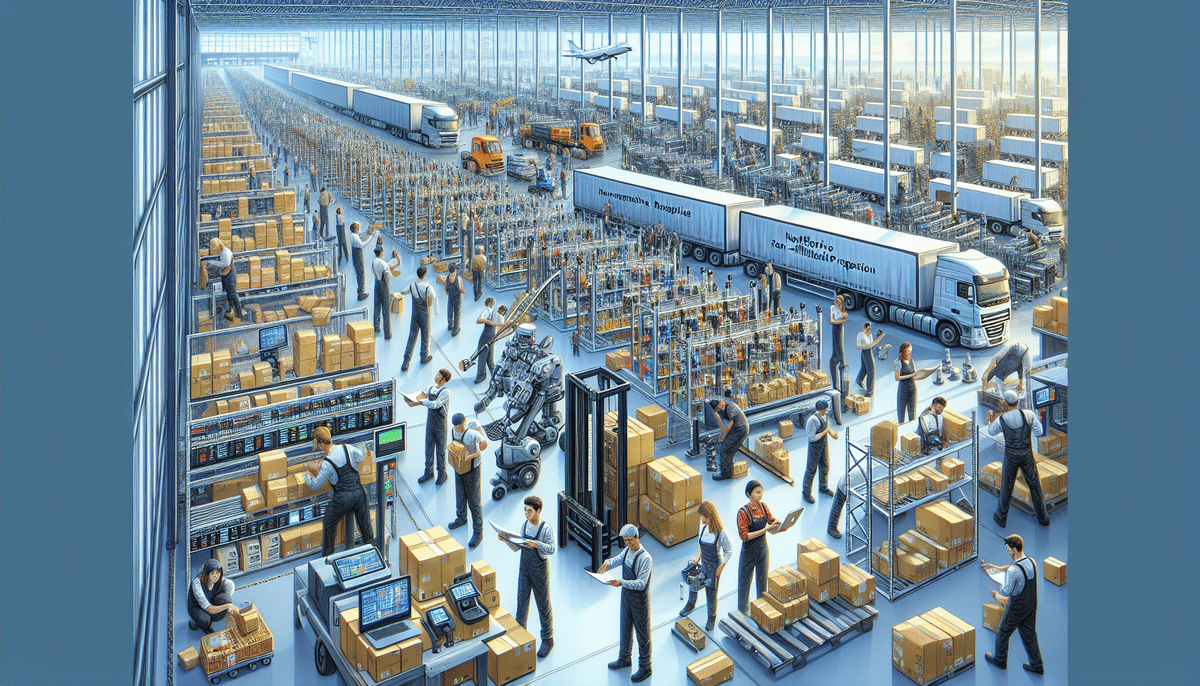An Overview and Features of 3PL Logistics Fulfillment and FBA Prep Logistics
As businesses expand, the demand for efficient logistics assistance increases. This is where 3PL (third-party logistics) fulfillment and FBA (Fulfillment by Amazon) prep logistics come into play. With 3PL, a company partners with another business to handle various facets of supply chain management, including inventory holding, shipping, and other related operations. FBA Prep, on the other hand, caters specifically to Amazon sellers by preparing their goods for shipment to Amazon warehouses.
The Importance of 3PL Logistics Fulfillment in Today's Business Environment
3PL has become a vital component of today's business landscape, particularly for e-commerce enterprises. According to a Statista report, the global 3PL market is projected to reach over $1.5 trillion by 2027, highlighting its significance.
Partnering with a reliable 3PL provider can streamline logistics processes and minimize the risk of costly errors such as delayed shipments or incorrect deliveries. Efficient 3PL services help businesses meet target delivery times and uphold customer expectations, leading to increased customer satisfaction and a stronger customer base.
- Cost Reduction: Outsourcing logistics to a 3PL provider eliminates the need for significant investments in warehouse space, transportation vehicles, and other logistics equipment, resulting in substantial cost savings.
- Scalability: As businesses grow, their logistics needs evolve. A reliable 3PL partner can adapt to these changes, offering customized solutions that cater to the unique requirements of each business.
- Focus on Core Competencies: By delegating logistics operations to experts, businesses can concentrate on their primary activities such as marketing, product development, and customer service.
How 3PL Logistics Fulfillment Helps Streamline Supply Chain Management
Outsourcing logistics to a 3PL company provides specialized expertise, advanced equipment, state-of-the-art software, and skilled personnel, ensuring optimal supply chain management. This leads to:
- Efficient Inventory Management: Accurate tracking and management of inventory levels to prevent overstocking or stockouts.
- Order Tracking and Delivery: Real-time tracking systems that provide visibility into order status, enhancing transparency and reliability.
- On-Time Order Processing: Swift and accurate processing of orders to ensure timely fulfillment and delivery.
According to a report by Forbes, businesses leveraging 3PL services experience up to a 20% reduction in logistics costs.
Furthermore, 3PL providers often have extensive networks of warehouses and distribution centers, enabling businesses to expand their market reach and improve customer satisfaction through faster and more reliable delivery options, such as same-day or next-day shipping.
Understanding the Benefits of FBA Prep Logistics for Amazon Sellers
Amazon imposes stringent requirements on sellers using FBA, including specific packaging, labeling, and shipping standards. FBA Prep Logistics assist Amazon sellers in adhering to these regulations by:
- Inspecting products for quality and compliance.
- Labeling items according to Amazon's guidelines.
- Packing and preparing shipments for Amazon warehouses.
By partnering with an FBA Prep provider, sellers can mitigate the risk of shipment delays and inventory discrepancies, leading to faster processing and more responsive customer service.
Moreover, outsourcing FBA Prep tasks allows sellers to focus on other critical aspects of their business, such as product development and marketing. According to Business Insider, sellers who use FBA Prep services report a 15% increase in operational efficiency.
Choosing the Right 3PL Provider for Your Business Needs
Selecting the appropriate 3PL provider is crucial for maintaining high-quality logistics operations. Key considerations include:
- Expertise: The provider should have specialized knowledge in transportation, warehousing, and inventory management.
- Customer Service: A strong commitment to customer service ensures responsive and reliable support.
- Technology: Advanced infrastructure and cutting-edge distribution centers enhance operational efficiency.
- Scalability: The ability to scale services in line with business growth is essential.
- Geographic Reach: For global operations, the provider's international logistics capabilities are important.
Conducting thorough due diligence, including reviewing client feedback and performance metrics, can aid businesses in making informed decisions.
Factors to Consider When Evaluating Different FBA Prep Providers
Choosing the right FBA Prep partner significantly impacts Amazon sales success. Essential factors include:
- Compliance Knowledge: The partner must be well-versed in Amazon's policies, requirements, and regulations.
- Proactive Issue Identification: Ability to anticipate and address potential issues before they escalate.
- Advanced Technology: Utilizing sophisticated technical solutions to streamline and optimize fulfillment processes.
- Customer Service: A dedicated support team that is responsive and provides timely updates on inventory status.
- Cost Efficiency: Competitive pricing without compromising on service quality, often achieved through negotiated shipping rates.
By carefully evaluating these factors, Amazon sellers can select an FBA Prep provider that enhances their operational efficiency and profitability.
The Role of Technology in Enhancing 3PL and FBA Prep Logistics Services
Technology plays a pivotal role in modern logistics. Key technologies include:
- Inventory Management Systems: Automate tracking and management of stock levels to ensure accuracy and efficiency.
- Warehouse Management Systems (WMS): Optimize warehouse operations, including storage, retrieval, and order fulfillment.
- Order Management Systems (OMS): Coordinate and streamline order processing from placement to delivery.
- Automation: Implementing conveyor belts, robotic arms, and automated guided vehicles (AGVs) to enhance movement and handling of goods.
According to IBM, the integration of automation in logistics can increase order processing speed by up to 30% while reducing errors by 25%.
Additionally, Forbes highlights the potential of blockchain technology in enhancing supply chain transparency, security, and efficiency, making it a promising innovation for 3PL and FBA Prep services.
Common Challenges Faced by Businesses in Outsourcing Their Fulfillment Operations
While outsourcing logistics offers numerous benefits, it also presents certain challenges:
- Cost Concerns: Higher upfront costs and potential hidden fees can impact budgets if not carefully managed.
- Loss of Control: Delegating logistics operations may lead to reduced oversight, necessitating robust monitoring mechanisms.
- Data Security: Sharing sensitive information with third-party providers increases the risk of data breaches and security issues.
- Communication Barriers: Differences in time zones, languages, and cultural practices can hinder effective communication and issue resolution.
To mitigate these challenges, businesses should:
- Establish clear communication channels and protocols.
- Implement stringent data protection agreements and security measures.
- Regularly monitor and evaluate the performance of their logistics partners.
Best Practices for Managing Your 3PL Logistics and FBA Prep Relationships
Maximizing the benefits of 3PL and FBA Prep partnerships requires strategic management. Best practices include:
- Clear Goals and Expectations: Define specific responsibilities, deadlines, and quality standards to ensure alignment between parties.
- Regular Communication: Maintain consistent and transparent communication to address issues promptly and foster collaboration.
- Performance Evaluation: Utilize metrics such as order accuracy, on-time delivery, and customer satisfaction to assess provider performance.
- Invest in Technology: Implement integrated system software to enhance transparency, collaboration, and accountability.
By adhering to these best practices, businesses can foster strong, productive relationships with their 3PL and FBA Prep partners, driving significant growth and operational efficiency.
Cost-Effective Strategies for Implementing 3PL and FBA Prep Solutions in Your Business
Implementing 3PL and FBA Prep solutions can be optimized for cost-efficiency through various strategies:
- Analyze Service Costs: Assess the pricing structures of potential providers, considering factors such as storage, handling, and pick-and-pack fees. Opt for providers that offer transparent pricing models, such as flat fees or access to parcel delivery discounts.
- Negotiate Volume Discounts: Leverage high order volumes to negotiate lower rates for services like storage and handling, resulting in long-term savings.
- Embrace Automation: Invest in providers that offer automated inventory management, order processing, and shipping solutions to reduce errors and increase operational efficiency.
According to Investopedia, businesses can achieve up to a 25% reduction in logistics-related costs by implementing strategic outsourcing practices.
Future Trends and Innovations in the World of 3PL Logistics Fulfillment and FBA Prep
The future of 3PL and FBA Prep logistics is heavily influenced by emerging technologies aimed at enhancing delivery processes and distribution efficiency. Key trends include:
- Robotics and Automation: Increased use of robots in warehouses for tasks such as sorting, packing, and transportation of goods.
- Blockchain Technology: Enhancing supply chain transparency, security, and traceability through decentralized ledger systems.
- Artificial Intelligence and Machine Learning: Leveraging AI for demand forecasting, route optimization, and predictive maintenance.
- Internet of Things (IoT): Implementing IoT devices for real-time tracking and monitoring of shipments and inventory.
Staying abreast of these innovations is essential for businesses aiming to maintain a competitive edge. Collaborating with logistics partners who invest in and adopt these technologies will enable businesses to optimize their supply chain operations effectively.
According to McKinsey & Company, the integration of these technologies could increase logistics productivity by up to 30% by 2030.




















